FOPPE DE HAAN AND RIXT VAN DER HORST ON PERSEVERANCE, ROLE MODELS AND THE FRISIAN MENTALITY IN ELITE SPORTS
A word is a word,
a deed is a deed
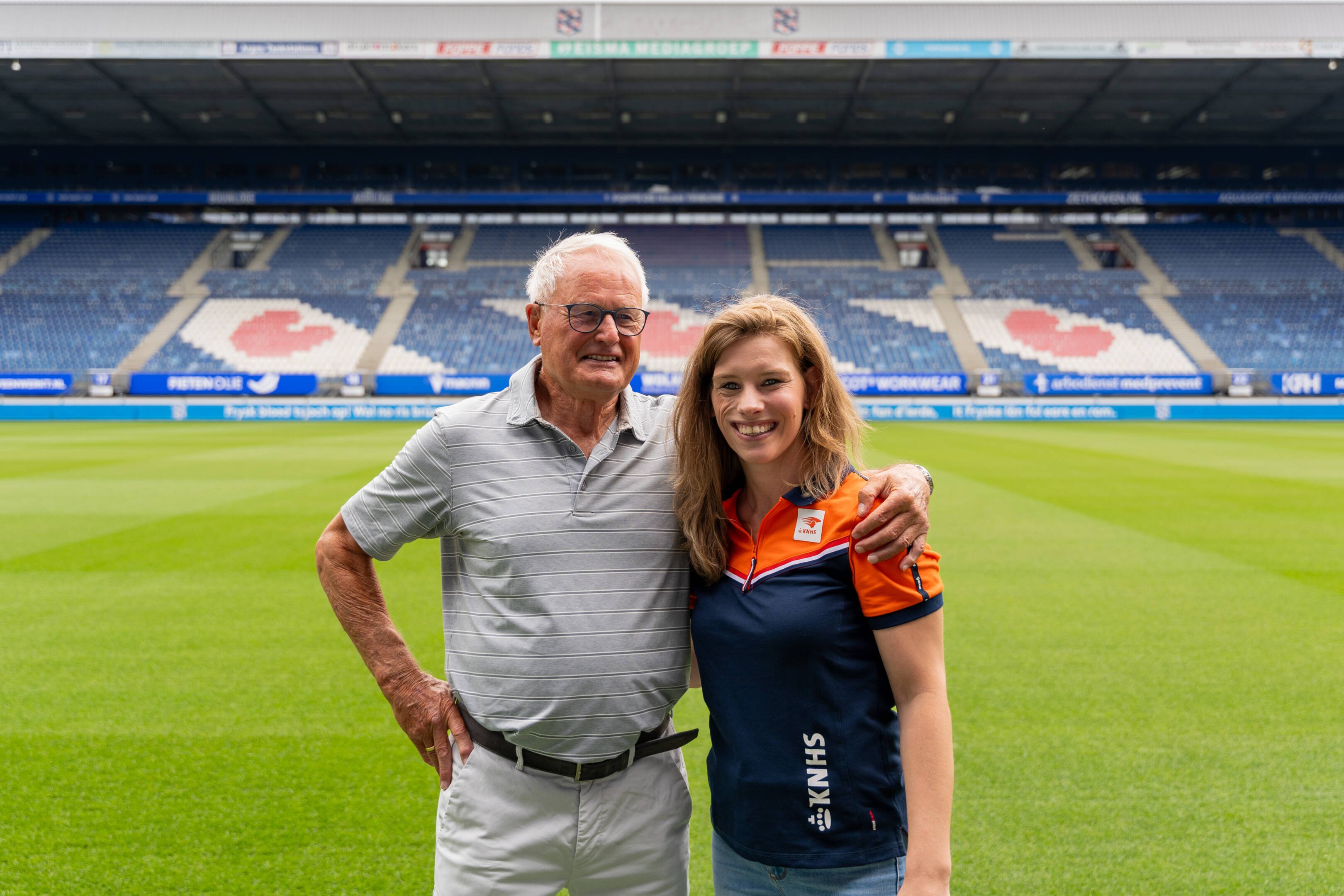
Rixt delivered a top performance and won three silver medals at the 2024 Paralympic Games
According to Foppe and Rixt, the indispensable seed that makes Frisians grow into top athletes is the sense of community. Foppe: “The villages have many sports clubs. For volleyball, handball, football, bridge, sailing, etc. A lot of clubs for so few people. There’s a real feeling of ‘we do it together’ and ‘sports are fun’. And that's how talent rises to the top, all the way to world championships.”
Rixt nods in agreement: “Yes, I think it’s really inspiring when you see someone from your own region become world champion or participate in the Olympic or Paralympic Games. Just someone from your own city or village, or from your own club. That sense of community also contributes enormously to sports. I used to be in a pony club. We went to competitions together almost every weekend, cheered each other on and laughed together, right up until the prizes were announced. Then there was a parade and we stood there waving flags. It was great! I have wonderful memories from that time. By the way, I’m still a member of the riding club in Grou, even though I don't live there any more. But I’ll always be a member.”
Groetnis oan dyn alders
As the interview wraps up, there’s still time to stand on the stadium grass for a moment. Foppe points out the Foppe Tribune and the Foppe Fund seats. It’s very understandable that this stadium is his favourite sports venue in Friesland. And relaxing, where do you do that in Friesland? Rixt: “On the water of course. That’s amazing. Sailing gives such a feeling of freedom, doesn't it? People are friendly, everyone says hi.” Foppe has a preference for the Wadden Islands. “We go to Ameland a lot. But I actually don't need anything to relax. Always been that way. When the world around you is good and people have the best intentions for you, you don't feel stressed. Then you can let it all go. But creating that is of course quite an art.” And then it was the end of the interview. Rixt and Foppe say goodbye as they switch to their mother tongue. Foppe: “Groetnis oan dyn alders, hè. En set ‘m op yn augustus!”
Foppe
"when the world around you is good and people have the best intentions for you, you don't feel stressed”
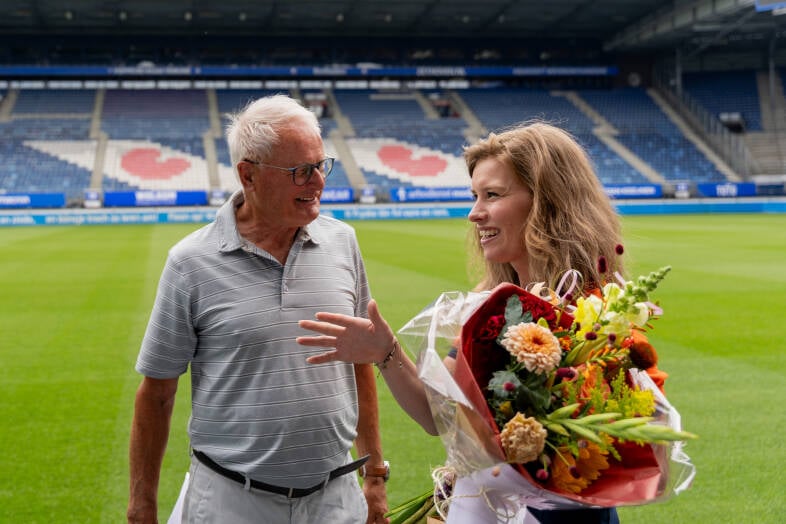
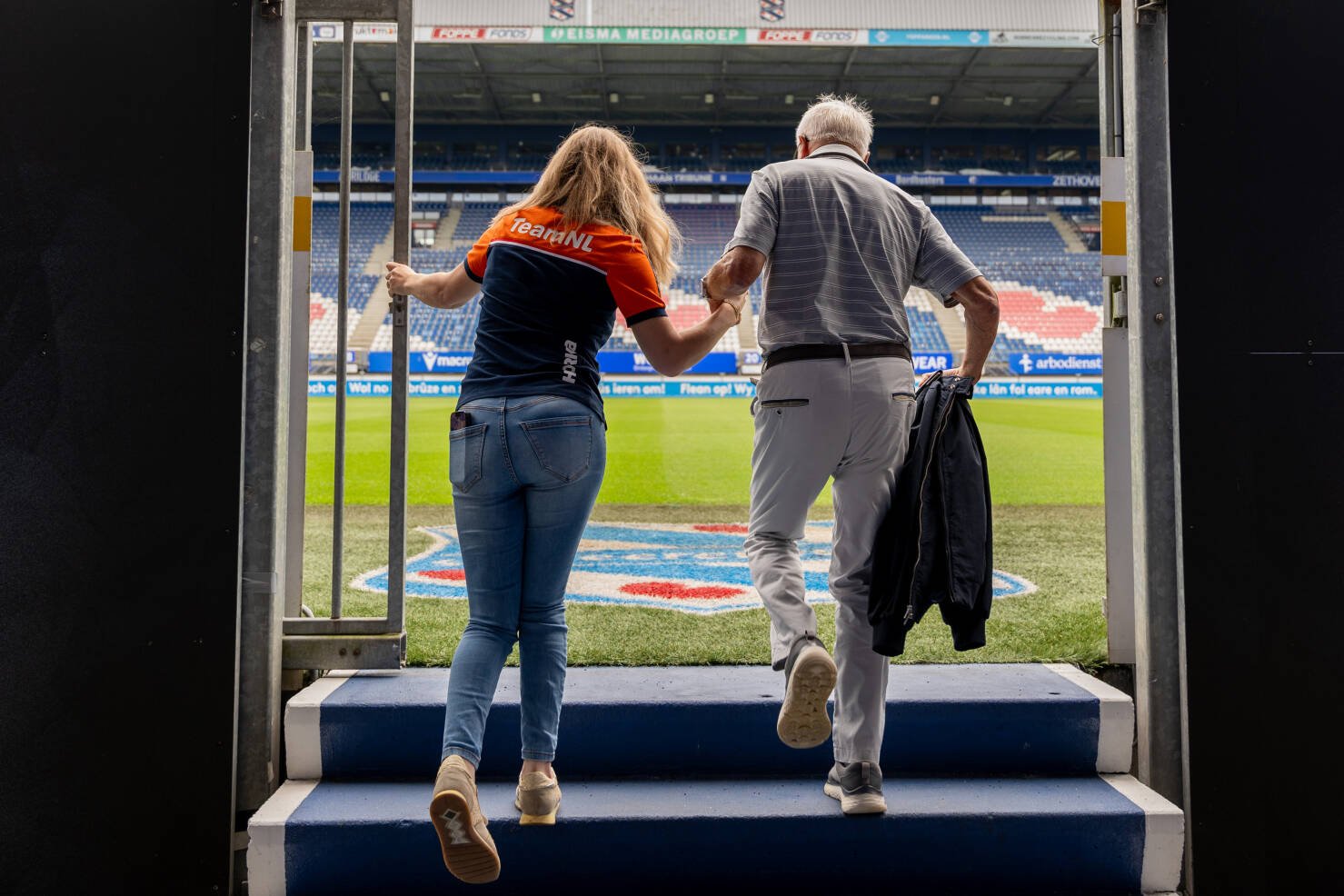
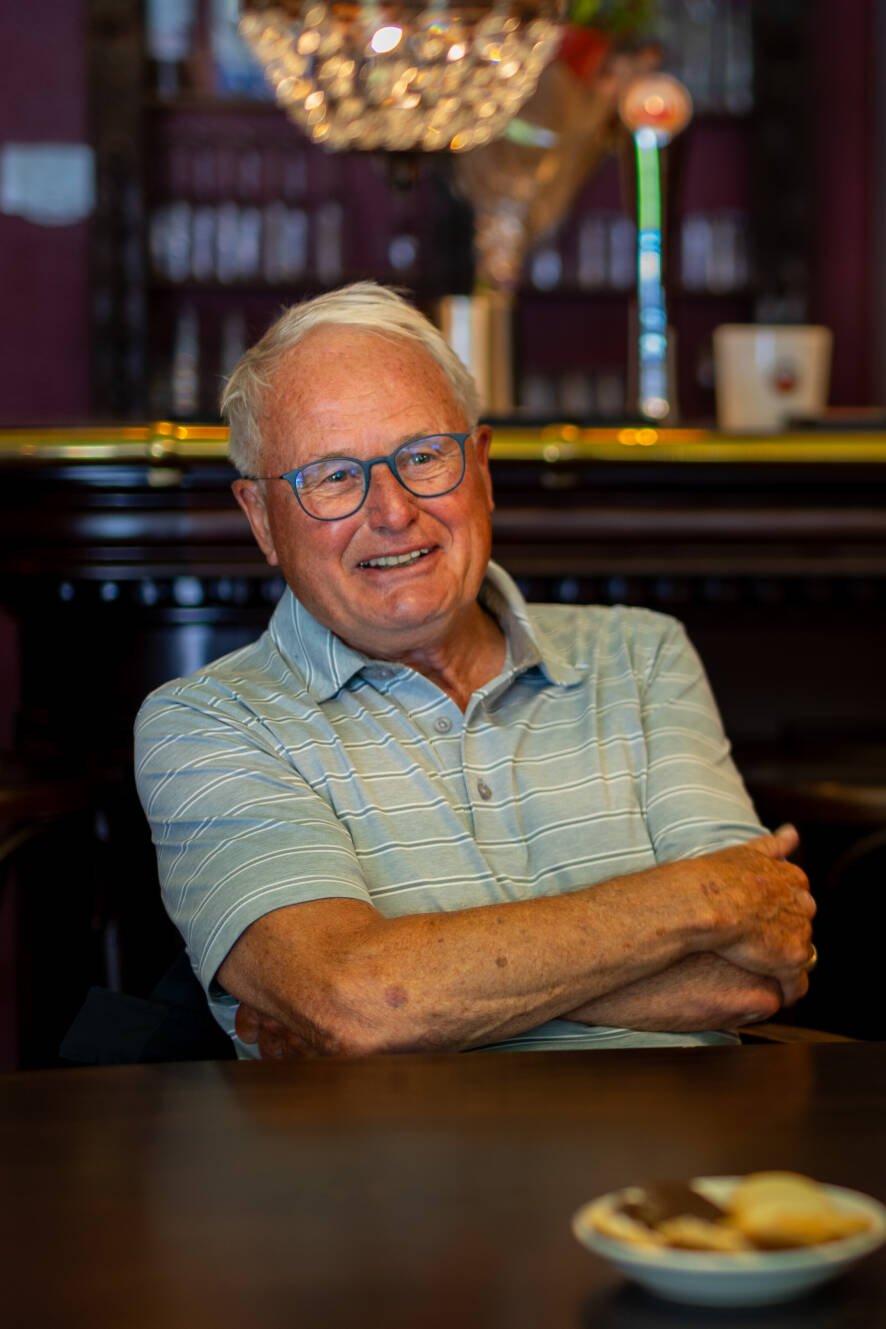
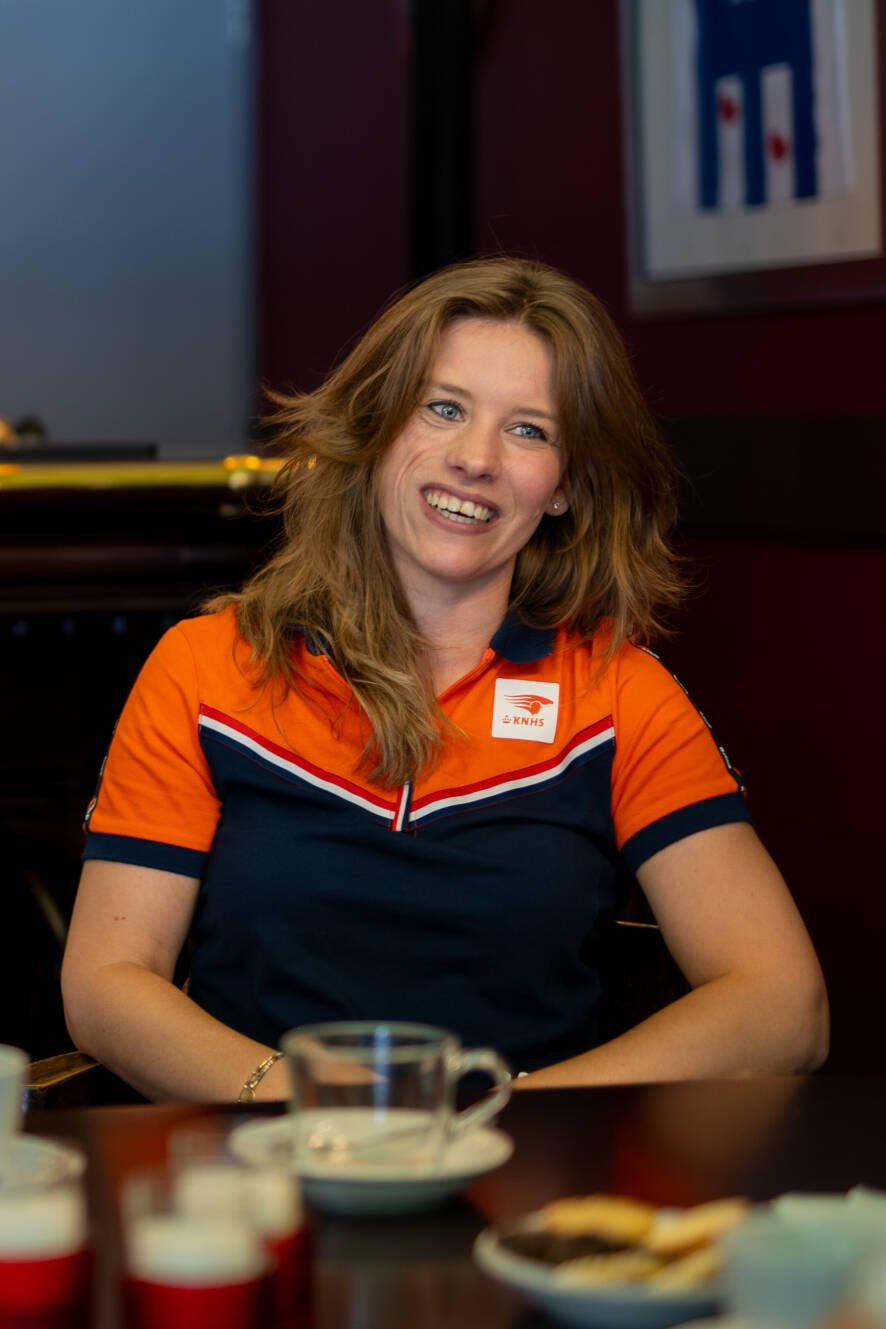
A Frisian to look up to
Who was her role model at that age? “Well, not a Paralympic athlete in any case,” Rixt explains. “I really looked up to greats like Anky van Grunsven and Tineke Bartels, who I even met once when I was 7. But I’ve mainly relied on my own need to prove myself. It's kind of natural. I may have had a disability, but I didn't want it to limit me. I just wanted to participate in regular sports, and I won prizes too.”
“But in 2008, I came into contact with para sports and discovered that I could also go to the Paralympic Games. That’s when the dream started to become real.” Foppe: “Well yeah, my role model was Abe Lenstra.” I had him to look up to as a little boy. When he’d played in Heerenveen, I read every word in the newspaper. And it was described in great detail there, right? Pass on the left, pass on the right. So I could imagine it all right in front of me.”
Just like Rixt didn’t have the money to buy a horse of this class, Foppe didn’t have enough money to buy a football. He laughs as he says: “Yeah, when I was a little boy I had some friends I wanted to play football with, but we didn't have our own football. So the teacher gave us a sponsor list and we went door to door asking for quarters. And it worked. We bought a leather ball and took turns taking care of it, a different boy had it every week. What happened to that ball? Yeah, no idea, I tried to buy the same kind in a second-hand shop on holiday once. I was going to go back to the shop for it but suddenly it was closed. Bad luck.”
The Frisian mentality
In their profession, both athletes come into contact with other cultures and other mentalities. Down-to-earth is what stands out most for Rixt. And you notice that difference already at the provincial level, Foppe also sees. “The guys from around Amsterdam are completely different. They’re more macho and have learned to fight and stand up for themselves at a young age. It’s different in Friesland. The Frisians are a little more cautious, I guess. But for Frisians it is also: a word is a word, a deed is a deed. If you agree to something, then you do it. That’s typical of Frisians.”
Lorem ipsum dolor sit amet, consectetur adipiscing elit.
The bright tone for the interview was set even before entering the Abe Lenstra Stadium. Foppe de Haan’s face is hidden behind a large bouquet of flowers as he walks towards the door. With a warm 'lokwinske, famke' he congratulates - almost in a whisper - Paralympic dressage rider Rixt van der Horst. “A fantastic achievement,” he nods at her. He’s talking about the nomination for the 2024 Paralympic Games, which will take place in Paris in five weeks. Rixt heard two days ago that she was selected.
With Foppe to the breeder
Once they get settled in the skybox, which is more like a cosy brown café, they start chatting. Foppe: “I still remember well when we met for the first time. I think you’d already applied for a helmet through the Foppe Fund, but now your father called me because you needed a new horse.” Rixt, laughs: “Yep, that's right! I remember we were at the stables in Burgum one evening. That's where we showed you Uniek (horse, ed.) for the first time.”
Rixt became world champion twice with this horse shortly after. Foppe: “The first time you rode Uniek, everyone on the sidelines saw there was something special. You only had to give tiny signals very subtly. You just understood each other. It was really spectacular to see.” The fact that Foppe de Haan was present at the training of a horse with a Paralympic dressage rider had everything to do with his Foppe Fund. A fund that makes sports possible for young people who need a little help whether it be money or a network. Since purchasing Uniek, Rixt has been an ambassador for the fund. Rixt writes on her website that she wants to be a role model for young people with disabilities by showing you can get the most out of life even with a disability.
Down-to-earth, honest, straight to the point. You can say all sorts of things about Frisians, but 'lazy’ is not one of them. This is also evident from the number of top athletes coming from Friesland every year. Especially for this magazine we brought together two such Frisian athletes in the Abe Lenstra Stadium in Heerenveen: Foppe de Haan, former football player and coach, and Rixt van der Horst, Paralympic dressage rider. They chatted in a skybox and walked the hallowed turf in the Heerenveen football stadium.
Rixt
FOPPE DE HAAN AND RIXT VAN DER HORST ON PERSEVERANCE, ROLE MODELS AND THE FRISIAN MENTALITY IN ELITE SPORTS
A word is a word,
a deed is a deed

According to Foppe and Rixt, the indispensable seed that makes Frisians grow into top athletes is the sense of community. Foppe: “The villages have many sports clubs. For volleyball, handball, football, bridge, sailing, etc. A lot of clubs for so few people. There’s a real feeling of ‘we do it together’ and ‘sports are fun’. And that's how talent rises to the top, all the way to world championships.”
Rixt nods in agreement: “Yes, I think it’s really inspiring when you see someone from your own region become world champion or participate in the Olympic or Paralympic Games. Just someone from your own city or village, or from your own club. That sense of community also contributes enormously to sports. I used to be in a pony club. We went to competitions together almost every weekend, cheered each other on and laughed together, right up until the prizes were announced. Then there was a parade and we stood there waving flags. It was great! I have wonderful memories from that time. By the way, I’m still a member of the riding club in Grou, even though I don't live there any more. But I’ll always be a member.”
Groetnis oan dyn alders
As the interview wraps up, there’s still time to stand on the stadium grass for a moment. Foppe points out the Foppe Tribune and the Foppe Fund seats. It’s very understandable that this stadium is his favourite sports venue in Friesland. And relaxing, where do you do that in Friesland? Rixt: “On the water of course. That’s amazing. Sailing gives such a feeling of freedom, doesn't it? People are friendly, everyone says hi.” Foppe has a preference for the Wadden Islands. “We go to Ameland a lot. But I actually don't need anything to relax. Always been that way. When the world around you is good and people have the best intentions for you, you don't feel stressed. Then you can let it all go. But creating that is of course quite an art.” And then it was the end of the interview. Rixt and Foppe say goodbye as they switch to their mother tongue. Foppe: “Groetnis oan dyn alders, hè. En set ‘m op yn augustus!”
Foppe
"when the world around you is good and people have the best intentions for you, you don't feel stressed”
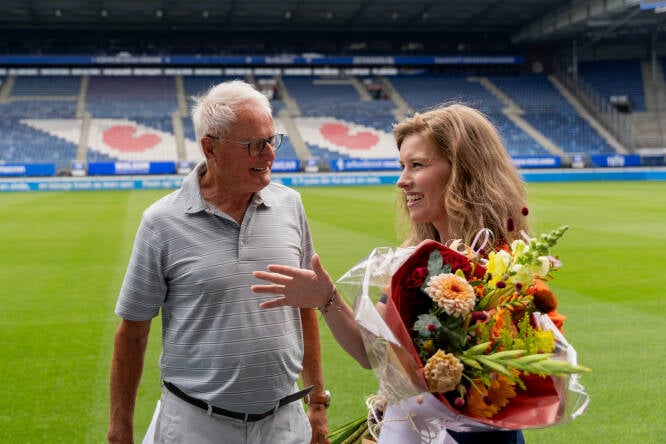
Rixt delivered a top performance and won three silver medals at the 2024 Paralympic Games
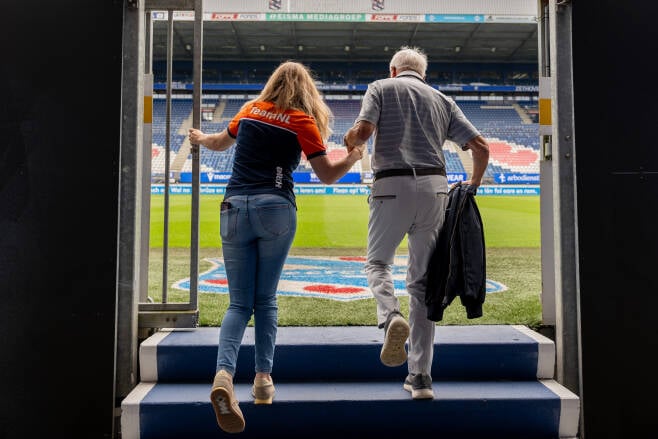
A Frisian to look up to
Who was her role model at that age? “Well, not a Paralympic athlete in any case,” Rixt explains. “I really looked up to greats like Anky van Grunsven and Tineke Bartels, who I even met once when I was 7. But I’ve mainly relied on my own need to prove myself. It's kind of natural. I may have had a disability, but I didn't want it to limit me. I just wanted to participate in regular sports, and I won prizes too.”
“But in 2008, I came into contact with para sports and discovered that I could also go to the Paralympic Games. That’s when the dream started to become real.” Foppe: “Well yeah, my role model was Abe Lenstra.” I had him to look up to as a little boy. When he’d played in Heerenveen, I read every word in the newspaper. And it was described in great detail there, right? Pass on the left, pass on the right. So I could imagine it all right in front of me.”
Just like Rixt didn’t have the money to buy a horse of this class, Foppe didn’t have enough money to buy a football. He laughs as he says: “Yeah, when I was a little boy I had some friends I wanted to play football with, but we didn't have our own football. So the teacher gave us a sponsor list and we went door to door asking for quarters. And it worked. We bought a leather ball and took turns taking care of it, a different boy had it every week. What happened to that ball? Yeah, no idea, I tried to buy the same kind in a second-hand shop on holiday once. I was going to go back to the shop for it but suddenly it was closed. Bad luck.”
The Frisian mentality
In their profession, both athletes come into contact with other cultures and other mentalities. Down-to-earth is what stands out most for Rixt. And you notice that difference already at the provincial level, Foppe also sees. “The guys from around Amsterdam are completely different. They’re more macho and have learned to fight and stand up for themselves at a young age. It’s different in Friesland. The Frisians are a little more cautious, I guess. But for Frisians it is also: a word is a word, a deed is a deed. If you agree to something, then you do it. That’s typical of Frisians.”
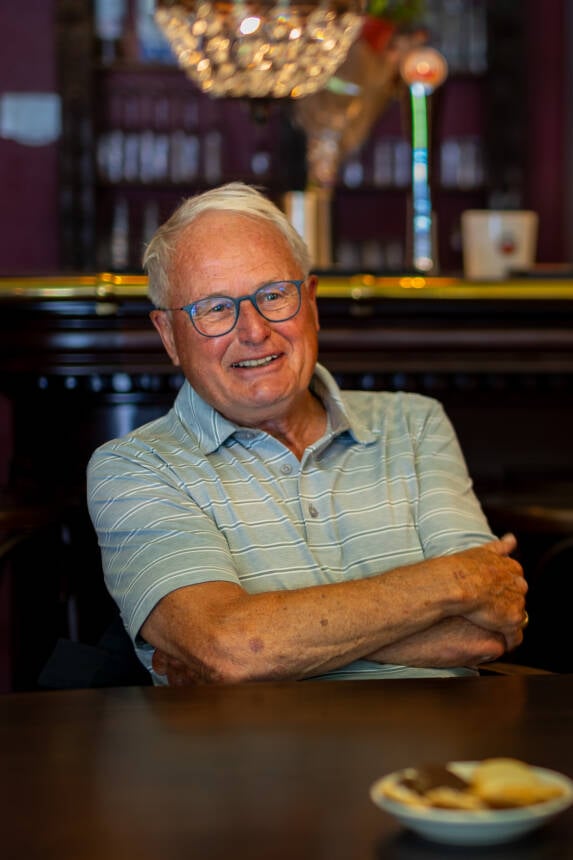
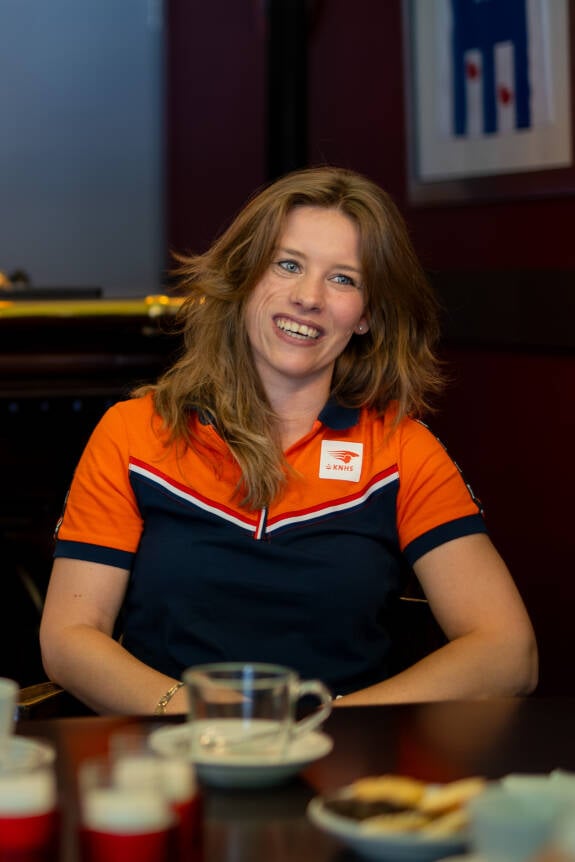
The bright tone for the interview was set even before entering the Abe Lenstra Stadium. Foppe de Haan’s face is hidden behind a large bouquet of flowers as he walks towards the door. With a warm 'lokwinske, famke' he congratulates - almost in a whisper - Paralympic dressage rider Rixt van der Horst. “A fantastic achievement,” he nods at her. He’s talking about the nomination for the 2024 Paralympic Games, which will take place in Paris in five weeks. Rixt heard two days ago that she was selected.
With Foppe to the breeder
Once they get settled in the skybox, which is more like a cosy brown café, they start chatting. Foppe: “I still remember well when we met for the first time. I think you’d already applied for a helmet through the Foppe Fund, but now your father called me because you needed a new horse.” Rixt, laughs: “Yep, that's right! I remember we were at the stables in Burgum one evening. That's where we showed you Uniek (horse, ed.) for the first time.”
Rixt became world champion twice with this horse shortly after. Foppe: “The first time you rode Uniek, everyone on the sidelines saw there was something special. You only had to give tiny signals very subtly. You just understood each other. It was really spectacular to see.” The fact that Foppe de Haan was present at the training of a horse with a Paralympic dressage rider had everything to do with his Foppe Fund. A fund that makes sports possible for young people who need a little help whether it be money or a network. Since purchasing Uniek, Rixt has been an ambassador for the fund. Rixt writes on her website that she wants to be a role model for young people with disabilities by showing you can get the most out of life even with a disability.
Rixt
Down-to-earth, honest, straight to the point. You can say all sorts of things about Frisians, but 'lazy’ is not one of them. This is also evident from the number of top athletes coming from Friesland every year. Especially for this magazine we brought together two such Frisian athletes in the Abe Lenstra Stadium in Heerenveen: Foppe de Haan, former football player and coach, and Rixt van der Horst, Paralympic dressage rider. They chatted in a skybox and walked the hallowed turf in the Heerenveen football stadium.